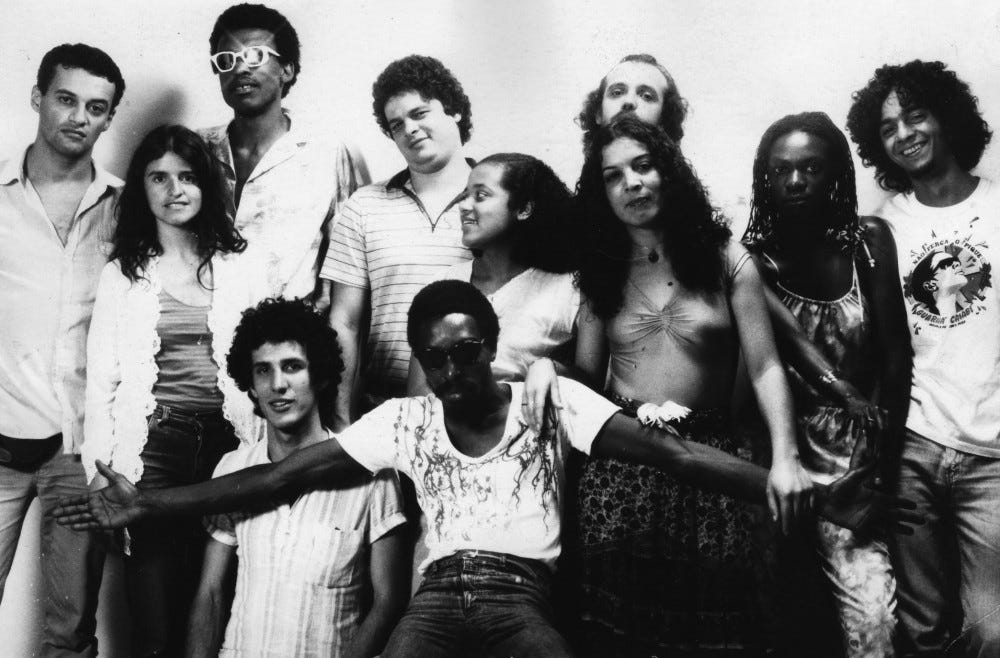Genre of the Day - Vanguarda paulista 🇧🇷
Album of the Day - A mulher do fim do mundo by Elza Soares (2015)
The other day, I had to inform a Canadian of all people who Joni Mitchell was (the singer is from Alberta) as we were driving past the Hollywood Bowl and I realized I had missed the legend’s return to form at the iconic venue. Understandably yet regrettably for me, demand was high and tickets soared into the hundreds and thousands. But just as with today’s featured artist, Joni’s return to stage in the last few years and performing gems of her repertoire she hasn’t revisited in decades is triumphal and represents the lifelong process of interpreting musical trends and growing with them as an artist. Today, we see a parallel example with a Brazilian legend harkening back to a short-lived but potent sociomusical movement of the early ‘80s.
Vanguarda paulista is a Brazilian microcosm of the global musical transformation of the ‘80s. As synthesizers and the spirit of punk spread, this democratization of music’s creation aligned with particular cultural movements. The city possesses the largest population of any metropolis in the Americas today, yet Rio typically has acted as the incubator for a greater number of musical movements from the popularization of samba to Brazilian funk; vanguarda paulista asserts Sao Paolo’s underrated voice by extending the cultural movement of tropicália for a new musical era.
A decade before vanguarda paulista emerged in the late ‘70s, tropicália as I also touched on in samba-rock had pushed back against the conservatism of the military dictatorship by musically declaring the integrality of Afro-Brazilian culture and rhythms and intertwining them with the psychedelic, avant-garde global musical zeitgeist. Vanguarda paulista sought a return to tropicália’s radical experimentations and avant-garde tinkering with traditional genres like samba and choro. Wild ideas abounded, and I hope that some vanguarda paulistas would’ve been subscribers, from satire and social operas to Grupo Rumo’s music imitating speech’s intonations and Arrigo Barnabé’s touches of modernist classical bizarreness. Independence and their DIY attitude fostered such inventiveness; consider it a rare positive externality from the otherwise dire economic Brazilian debt crisis of the ‘80s that crippled several industries.
Elza Soares is now a two-time visitor to this column, and it’s a blessing that she has. Few artists have as fascinating and satisfying a life story; she began her career ablaze after appearing on a competition where she appeared in bedraggled clothing, riding from rags to riches on the strength of her voice which could fill a samba or big band setting, as in sambalanço, with a singular zeal. When she became involved with married soccer legend Mané Garrincha about a decade into her fame, their relationship not only became tabloid fodder but elicited such anger that the military fired into their home and Soares had to flee the country. Not even the threat of death could contain her passion for music, and once she came home, the singer remained prolific and ingenious. In her seven decades as a performer, she continuously advanced Afro-Brazilian representation and asserted pride for her favela upbringing at a time of little visibility for Brazil’s social periphery.
Her 2015 art-rock A mulher do fim do mundo, recorded in her mid-80s, is a musical triumph in a life abundant with them. She looks back to vanguarda paulista and fashions her own dramatic reimagining of decades of different Brazilian musical strains she’d been central to. The title track is an ode to Carnival as a celebratory haven from the difficulties endured as a result of her social background, its instrumental reflecting this emotional complexity in the friction of menacing electric guitar against acoustic, conversational strums; it releases into samba euphoria in the chorus as her weathered but preternaturally towering voice and boundlessly creative stylings take center stage. “Maria da Vila Matilde” punks the cuica while excoriating the cowardice of abusive spouses. Cinematic melancholia enwraps “Solto,” as she contemplates death and the beauty of Blackness. Just as vanguarda paulista declares the endless limits of Brazilian musical creativity, Soares demonstrates how at the individual level, to advance and age is a never-ending opportunity to evolve, reinterpret, and express one’s artistry and accumulated wisdom.







Def going to check out this Brazilian sound - thanks for the tip!